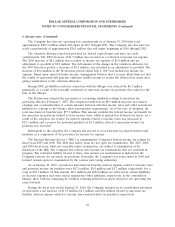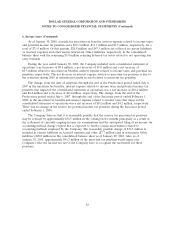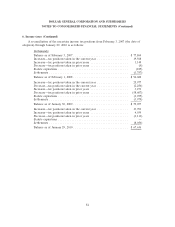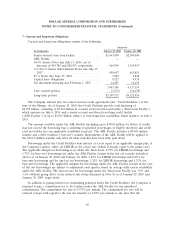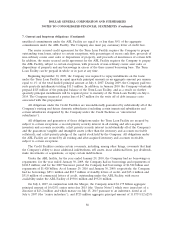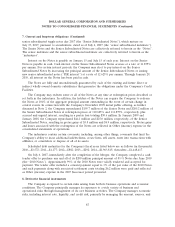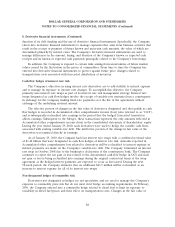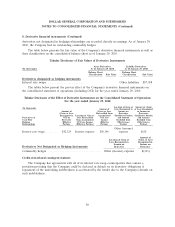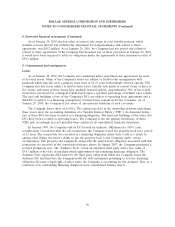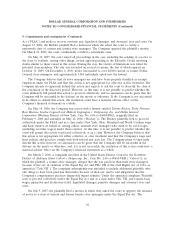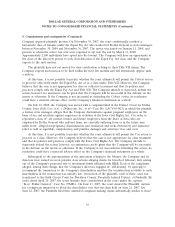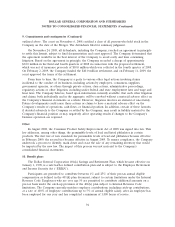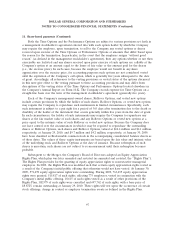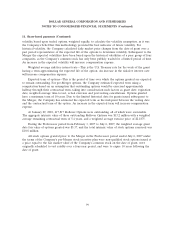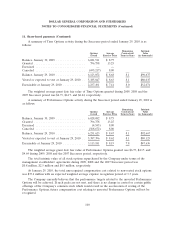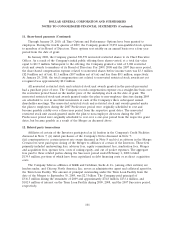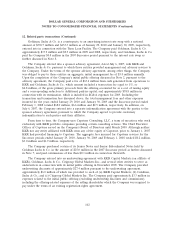Dollar General 2009 Annual Report Download - page 103
Download and view the complete annual report
Please find page 103 of the 2009 Dollar General annual report below. You can navigate through the pages in the report by either clicking on the pages listed below, or by using the keyword search tool below to find specific information within the annual report.DOLLAR GENERAL CORPORATION AND SUBSIDIARIES
NOTES TO CONSOLIDATED FINANCIAL STATEMENTS (Continued)
9. Commitments and contingencies (Continued)
Act (‘‘FLSA’’) and seeks to recover overtime pay, liquidated damages, and attorneys’ fees and costs. On
August 15, 2006, the Richter plaintiff filed a motion in which she asked the court to certify a
nationwide class of current and former store managers. The Company opposed the plaintiff’s motion.
On March 23, 2007, the court conditionally certified a nationwide class.
On May 30, 2007, the court stayed all proceedings in the case, including the sending of a notice to
the class, to evaluate, among other things, certain appeals pending in the Eleventh Circuit involving
claims similar to those raised in this action. During the stay, the statute of limitations was tolled for
potential class members. The stay was extended on several occasions, the last of which expired on
October 31, 2009. On December 2, 2009, notice was mailed to over 28,000 current or former Dollar
General store managers, and approximately 3,860 individuals opted into the lawsuit.
The Company believes that its store managers are and have been properly classified as exempt
employees under the FLSA and that this action is not appropriate for collective action treatment. The
Company intends to vigorously defend this action and expects to ask the court to decertify the class at
the conclusion of the discovery period. However, at this time, it is not possible to predict whether the
court ultimately will permit this action to proceed collectively, and no assurances can be given that the
Company will be successful in the defense on the merits or otherwise. If the Company is not successful
in its efforts to defend this action, the resolution could have a material adverse effect on the
Company’s financial statements as a whole.
On May 18, 2006, the Company was served with a lawsuit entitled Tammy Brickey, Becky Norman,
Rose Rochow, Sandra Cogswell and Melinda Sappington v. Dolgencorp, Inc. and Dollar General
Corporation (Western District of New York, Case No. 6:06-cv-06084-DGL, originally filed on
February 9, 2006 and amended on May 12, 2006 (‘‘Brickey’’)). The Brickey plaintiffs seek to proceed
collectively under the FLSA and as a class under New York, Ohio, Maryland and North Carolina wage
and hour statutes on behalf of, among others, assistant store managers who claim to be owed wages
(including overtime wages) under those statutes. At this time, it is not possible to predict whether the
court will permit this action to proceed collectively or as a class. However, the Company believes that
this action is not appropriate for either collective or class treatment and that the Company’s wage and
hour policies and practices comply with both federal and state law. The Company plans to vigorously
defend this action; however, no assurances can be given that the Company will be successful in the
defense on the merits or otherwise, and, if it is not successful, the resolution of this action could have a
material adverse effect on the Company’s financial statements as a whole.
On March 7, 2006, a complaint was filed in the United States District Court for the Northern
District of Alabama (Janet Calvert v. Dolgencorp, Inc., Case No. 2:06-cv-00465-VEH (‘‘Calvert’’)), in
which the plaintiff, a former store manager, alleged that she was paid less than male store managers
because of her sex, in violation of the Equal Pay Act and Title VII of the Civil Rights Act of 1964, as
amended (‘‘Title VII’’). The complaint subsequently was amended to include additional plaintiffs, who
also allege to have been paid less than males because of their sex, and to add allegations that the
Company’s compensation practices disparately impact females. Under the amended complaint, Plaintiffs
seek to proceed collectively under the Equal Pay Act and as a class under Title VII, and request back
wages, injunctive and declaratory relief, liquidated damages, punitive damages and attorney’s fees and
costs.
On July 9, 2007, the plaintiffs filed a motion in which they asked the court to approve the issuance
of notice to a class of current and former female store managers under the Equal Pay Act. The
92


